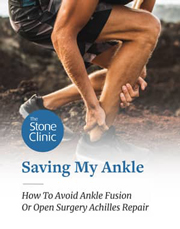Articular cartilage transplantation to 1st metatarsal joint (Big toe) post-operative physical therapy protocol
General Considerations
- Non weight bearing status for 4 weeks post-operative.
- Patients may need a posterior splint to remind them not to bear weight through foot with aide of crutches, or can use a post operative shoe which puts weight in heel of foot only.
- Regular manual treatment should be conducted to decrease the incidence of fibrosis. No scar mobilization until 4 weeks post operative.
- Light to no resistance stationary cycling is okay at 2 weeks post-operative with heel contact only.
- Low impact activities for 4 months post-operative.
*Use of the continuous passive motion machine (CPM) for 6-8 hours a day for 4 weeks is imperative.
Week 1
- Nurse visit day 2 to change dressing and review home program.
- Icing and elevation every 2 hours for 15 minute sessions during wake hours.
- CPM (continuous passive motion machine) at home for at least 6 hours every day.
Manual
- Soft tissue treatments, effleurage for edema, gentle range of motion.
Exercises
- Extremity non weight bearing strengthening exercises (i.e. lying, seated, and standing straight leg raise exercises, isometrics, well-leg stationary cycling, upper body conditioning).
- Ankle exercises, core strengthening.
Goals
- Decrease pain, edema.
- Gait non weight bearing x 4 weeks.
- Range of motion full unless otherwise indicated by MD
Weeks 2 - 4
- Nurse visit at 14 days for suture removal and check-up.
Manual
- Soft tissue treatments, effleurage for edema, range of motion.
- Manual resisted (Proprioceptive neuromuscular facilitation patterns) of ankle and hip.
Exercises
- Non weight bearing aerobic exercises (i.e. unilateral cycling, UBE, Schwinn Air-Dyne noninvolved limb and arms only).
- AFTER 2 weeks, bilateral cycling with light to no resistance, slow cadence; heel contact only.
Goals
- Decrease pain, edema. Gait non weight bearing x 4 weeks.
Weeks 4 - 6
- M.D. visit at 4 weeks, will progress to partial weight bearing and discontinue use of splint. Progression to full weight bearing is dependent on demonstration of good gait mechanics.
Manual
- Continue with soft tissue mobilizations, range of motion, and okay to add light joint mobilizations.
Exercises
- initiate resistance to 1st digit toe flexion/extension.
- Incorporate functional exercises (i.e. squats, lunges, Shuttle/leg press, calf exercises, step-ups/lateral step-ups).
- light to no resistance toe on peddle stationary cycling, slow cadence, pain-free.
- Balance/proprioception exercises, seated calf raises.
- Slow to rapid walking on treadmill (preferably a low-impact treadmill).
- Pool/deep water workouts after incisions closed with the use of the splint.
Goals
- Gait partial weight bearing to full weight bearing per quality.
- Range of motion 80% of non-surgical limb.
Weeks 6 - 8
- Increase the intensity of functional exercises (i.e. add stretch cord for resistance, increase weight with weightlifting machines).
- Add standing calf raises.
Goals
- Full range of motion.
- Full weight bearing, good gait mechanics.
Weeks 8 - 12
- Out door cycling, initiating with flat surfaces, slow cadence with slow progression to hills.
- Sports test 1 at 12 weeks.
- Low-impact activities until 16 weeks.
- Patients should be pursuing a home program with emphasis on sport/activity-specific training.
Goals
- Complete and pass Sports test 1.
*No cutting, running, jumping, or explosive type exercises for 5-6 months post operative.
NOTE: All progressions are approximations and should be used as a guideline only. Progression will be based on individual patient presentation, which is assessed throughout the treatment process.
